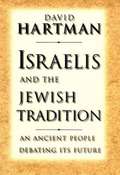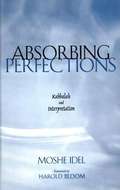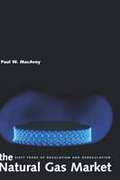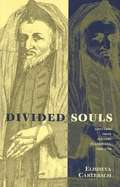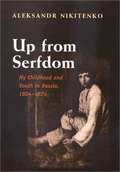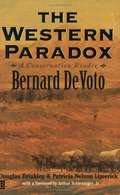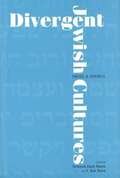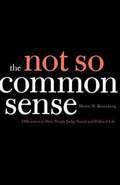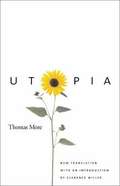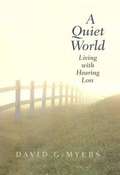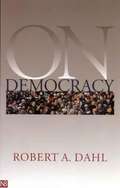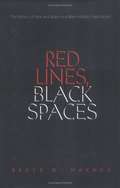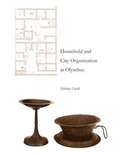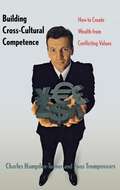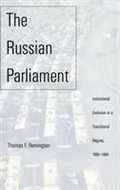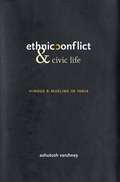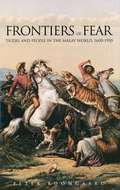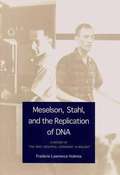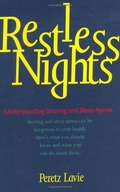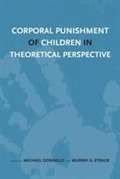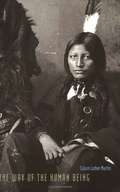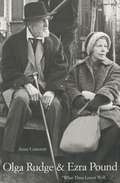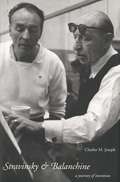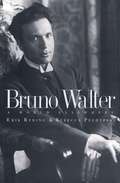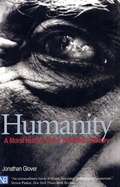- Table View
- List View
Israelis and the Jewish Tradition: An Ancient People Debating its Future
by David HartmanOne of the most important Jewish thinkers in the world today grapples with issues that increasingly distance Israel's secular Jewish community from its religious Zionists. Hartman, who is deeply committed to religious pluralism, suggests a more inclusive and inviting framework for the modern Israeli engagement of the Jewish tradition.
Absorbing Perfections: Kabbalah and Interpretation
by Moshe IdelThis book deals mainly with material found in a vast body of literature designated by its authors and by modern scholars as Kabbalah. Basically a medieval corpus, this literature consists of a variety of schools, trends, models, ideals, and techniques.
The Natural Gas Market: Sixty Years of Regulation and Deregulation
by Paul W. MacavoySix decades of efforts by federal agencies to regulate the natural gas industry in the U. S. have failed, says the author of this important book. Paul MacAvoy shows that no one has gained from public control of the natural gas industry, and he argues that all participants would gain from complete deregulation. For regulated and about-to-be-regulated industries, the costly history of gas regulation is a tale to heed well.
Divided Souls: Converts from Judaism in Germany, 1500-1750
by Elisheva CarlebachCarlebach (history, Queens College and CUNY) writes that while conversion usually summoned up a kind of transfiguration and rebirth into a superior religion, the meaning began eroding when speaking of 16th century German Jews. Christians increasingly saw Jewish converts as "`taufjuden,' baptized, but not truly converted," a sentiment derived from earlier centuries with the crusaders. Carlebach's close readings of writings by converts provide instruction in Christian self-definition and Jewish identity in German lands. Overwhelmingly, the Jewish side of these uneasy converts never atrophied, but instead had a positive effect on their new Christian identity. Such converts would become central in the formation of a Jewish image held by both Christians and Jews for years to come.
Up from Serfdom: My Childhood and Youth in Russia, 1804-1824
by Aleksandr Nikitenko Helen Saltz Jacobson"Aleksandr Nikitenko, descended from once-free Cossacks, was born into serfdom in provincial Russia in 1804. One of 300,000 serfs owned by Count Sheremetev, Nikitenko as a teenager became fiercely determined to gain his freedom. In this book, here translated into English for the first time, Nikitenko recollects the details of his childhood and youth in servitude, as well as the six-year struggle that at last delivered him into freedom in 1824. Among the very few autobiographies ever written by an ex-serf, Up from Serfdom provides a unique portrait of serfdom in nineteenth-century Russia and a profoundly clear sense of what such bondage meant to the people, the culture, and the nation."--BOOK JACKET. Title Summary field provided by Blackwell North America, Inc. All Rights Reserved
The Western Paradox: A Conservation Reader
by Bernard Devoto Arthur M. Schlesinger Patricia Nelson Douglas BrinkleyThis book is the fascinating record of DeVoto's crusade to save the West from itself.
Divergent Jewish Cultures: Israel and America
by Deborah Dash Moore S. Ilan TroenThis book is the third in the series Studies in Jewish Culture and Society, published by the Center for Advanced Judaic Studies of the University of Pennsylvania.
The Not So Common Sense: Differences in How People Judge Social and Political Life
by Shawn W. RosenbergIn this fascinating interdisciplinary book, Shawn W. Rosenberg challenges two basic assumptions that orient much contemporary social scientific thinking. Offering theory and empirical research, he rejects the classic liberal view that people share a basic "common sense" or rationality. At the same time, he questions the view of contemporary social theory that meaning is simply an intersubjective or cultural product. Through in-depth interviews, Rosenberg explores the underlying logic of cognition. Rather than discovering a common sense or rationality, he finds that people reason in fundamentally different ways, and these differences affect the kind of understandings they craft and the evaluations they make. As a result, people actively reconstruct culturally prevalent meanings and norms in their own subjective terms. Rosenberg provides a comprehensive description of three types of socio-political reasoning and the full text of three exemplary interviews. Rosenberg's findings help explain such puzzling social phenomena as why people do not learn even when it is to their advantage to do so, or why they fail to adapt to changed social conditions even when they have clear information and motivation. The author argues that this kind of failure is commonplace and discusses examples ranging from the crisis of modernity to the classroom performance of university students. Building on the ideas of Jean Piaget, George Herbert Mead, and Jurgen Habermas, Rosenberg offers a new orienting vision, structural pragmatics, to account for these social phenomena and his own research in cognition. In the concluding chapter, he discusses the implications of his work for the study of social cognition,political behavior, and democratic theory.
Utopia
by Thomas More Clarence H. MillerUtopia depicts a fictional island with its own unique religion and customs. Sir Thomas More introduces readers into the concept of a perfect society with utopian, or perfect, ideas and beliefs.
A Quiet World: Living with Hearing Loss
by David G. MyersSome 28 million people in America and 350 million people worldwide live with hearing loss. How do these people and their families cope? What are their experiences of pain, humor, and hope? What support do medicine and technology now offer them, and what is on the horizon? In this engaging and practical book, David Myers, who has himself suffered gradual hearing loss, explores the problems faced by the hard of hearing at home and at work and provides information on the new technology and groundbreaking surgical procedures that are available.<P> Drawing on both his own experiences and his expertise as a social psychologist, Myers recounts how he has coped with hearing loss and how he has incorporated technological aids into his life. The family and friends of the hard of hearing also face adjustments. Myers addresses their situation and provides advice for them on how best to alert loved ones to a hearing problem, persuade them to seek assistance, and encourage them to adjust to and use hearing aids.
On Democracy
by Robert A. DahlIn this accessible and authoritative book, an eminent political theorist provides a primer on democracy that clarifies what it is, why it is valuable, how it works, and what challenges it confronts in the future.
Red Lines, Black Spaces: The Politics of Race and Space in a Black Middle-class Suburb
by Bruce D. HaynesRed Lines, Black Spaces is a case study of Nepperhan-Runyon Heights, one of the first middle-class black suburbs in the New York metropolitan region. Runyon Heights is nestled in the northeast section of Yonkers, New York, on the banks of the Hudson River, in the southwest corner of Westchester County, just north of New York City.
Household and City Organization at Olynthus
by Nicholas CahillOlynthus, one of the best-preserved ancient Greek cities, was excavated in the 1920s and 1930s, revealing more than a hundred houses and their exceptionally complete contents. In this copiously illustrated book, Nicholas Cahill analyzes this archaeological information and provides important new insights into the daily lives of the ancient Greeks, the organization of their public and domestic space, and the economic and social patterns in Olynthus.
Building Cross-Cultural Competence: How to Create Wealth from Conflicting Values
by Charles Hampden-Turner Fons Trompenaars David LewisBased on 14 years of research involving nearly 50,000 managerial respondents and on the authors' extensive experience in international business, this book uses humor, cartoons, and numerous business examples to show managers how to reconcile cultural differences in the workplace.
The Russian Parliament: Institutional Evolution in a Transitional Regime, 1989-1999
by Thomas F. RemingtonPolitical representation and parliamentary power -- Gorbachev's constitutional reforms -- Organizing the new USSR Parliament -- The power game in Russia, 1990-1993 -- Deputies and lawmaking in the RSFSR Supreme Soviet -- Framing a new constitution -- Organizing the Federal Assembly -- Does parliament matter'.
Ethnic Conflict and Civic Life: Hindus and Muslims in India
by Ashutosh VarshneyThis timely book, updated for the paperback edition, examines how civic ties between Hindus and Muslims in different Indian cities serve to contain, or even prevent, ethnic violence. It is of interest not only to South Asian scholars and policymakers but also to those studying multiethnic societies in other areas of the world.
Frontiers of Fear: Tigers and People in the Malay World, 1600-1950
by Peter BoomgaardThis book is about the relation between humans and the three big cats of the Malay world: the tiger, the leopard, and the clouded leopard. Above all, however, it is about the tiger.It is difficult to be neutral about tigers. They seem to elicit either strongly positive or strongly negative sentiments, and it is even possible (and far from rare) that one person has both positive and negative feelings about tigers.
Meselson, Stahl, and the Replication of DNA: A History of "the Most Beautiful Experiment in Biology"
by Frederic Lawrence HolmesIn 1957 two young scientists at the California Institute of Technology performed an experiment that provided convincing evidence that DNA replicates in the manner predicted by the model of the double helix proposed four years earlier by James Watson and Francis Crick.
Restless Nights: Understanding Snoring and Sleep Apnea
by Peretz LavieIn this accessible discussion, an expert in sleep research reveals the history, symptoms, risks, and treatment of snoring and sleep apnea.
Corporal Punishment of Children in Theoretical Perspective
by Michael Donnelly Murray Arnold StrausDespite being commonplace in American households a generation ago, corporal punishment of children has been subjected to criticism and shifting attitudes in recent years. Many school districts have banned it, and many child advocates recommend that parents no longer spank or strike their children. In this book, social theorist Michael Donnelly and family violence expert Murray A. Straus tap the expertise of social science scholars and researchers who address issues of corporal punishment, a subject that is now characterized as a key issue in child welfare. The contributors discuss corporal punishment, its use, causes, and consequences, drawing on a wide array of comparative, psychological, and sociological theories. Together, they clarify the analytical issues and lay a strong foundation for future research and interdisciplinary collaboration.
The Way of the Human Being
by Calvin MartinFrom Native Americans, Europeans learned about corn and beans, toboggans and canoes, and finding their way around an unfamiliar landscape. Yet the Europeans learned what they wished to learn―not necessarily what the natives actually meant by their stories and their lives―says Calvin Luther Martin in this unique and powerfully insightful book. By focusing on their own questions, Martin observes, those arriving in the New World have failed to grasp the deepest meaning of Native America. <p><p> Drawing on his own experiences with native people and on their stories, Martin brings us to a new conceptual landscape―the mythworld that seems unfamiliar and strange to those accustomed to western ways of thinking. He shows how native people understand the world and how human beings can and should conduct themselves within it. Taking up the profound philosophical challenge of the Native American “way of the human being,”
Olga Rudge and Ezra Pound: What Thou Lovest Well ...
by Anne ConoverA loving and admiring companion for half a century to literary titan Ezra Pound, concert violinist Olga Rudge was the muse who inspired the poet to complete his epic poem,The Cantos,and the mother of his only daughter, Mary. Strong-minded and defiant of conventions, Rudge knew the best and worst of times with Pound. With him, she coped with the wrenching dislocations brought about by two catastrophic world wars and experienced modernism's radical transformation of the arts. In this enlightening biography, Anne Conover offers a full portrait of Olga Rudge (1895-1996), drawing for the first time on Rudge's extensive unpublished personal notebooks and correspondence. Conover explores Rudge's relationship with Pound, her influence on his life and career, and her perspective on many details of his controversial life, as well as her own musical career as a violinist and musicologist and a key figure in the revival of Vivaldi's music in the 1930s. In addition to mining documentary sources, the author interviewed Rudge and family members and friends. The result is a vivid account of a highly intelligent and talented woman and the controversial poet whose flame she tended to the end of her long life. The book quotes extensively from the Rudge-Pound letters--an almost daily correspondence that began in the 1920s and continued until Pound's death in 1972. These letters shed light on many aspects of Pound's disturbing personality; the complicated and delicate balance he maintained between the two most significant women in his life, Olga and his wife Dorothy, for fifty years; the birth of Olga and Ezra's daughter Mary de Rachewiltz; Pound's alleged anti-Semitism and Fascist sympathies; his wartime broadcasts over Rome radio and indictment for treason; and his twelve-year incarceration in St. Elizabeth's Hospital for the mentally ill.
Stravinsky and Balanchine: A Journey of Invention
by Charles M. JosephThis book is about the collaboration of some of the greatest artists in the twentieth century, Igor Stravinsky and George Balanchine.
Bruno Walter: A World Elsewhere
by Rebecca Pechefsky Erik RydingBruno Walter, one of the greatest conductors in the twentieth century, lived a fascinating life in difficult times. This engrossing book is the first full-length biography of Walter to appear in English. Erik Ryding and Rebecca Pechefsky describe Walter's early years in Germany, where his successes in provincial theaters led to positions at the Berlin State Opera and the Vienna State Opera. They then tell of his decade-long term as Bavarian music director and his romantic involvement with the soprano Delia Reinhardt; his other positions in the musical community until he was ousted from Germany when the Nazi Party came to power in 1933; and his return to Vienna, where he was artistic director of the Opera House until he was again forced out by the Nazis. Finally they trace his career in the United States, where he led the New York Philharmonic and other orchestras and in his last years made numerous recordings with the Columbia Symphony Orchestra, an ensemble created especially for him. Ryding and Pechefsky are the first biographers to make extensive use of the thousands of unpublished letters in the Bruno Walter Papers, now in the New York Public Library for the Performing Arts. In addition to interviewing more than sixty people who knew Walter, they examined countless reviews to assess the popular and critical impact he had on his times. Authoritative and even-handed, this biography sheds new light on Walter, one of the great formative influences in musical interpretation.
Humanity: A Moral History of the Twentieth Century
by Jonathan GloverThis important book confronts the brutal history of the 20th century to unravel the psychological mystery of why so many atrocities occurred--the Holocaust, Hiroshima, the Gulag, Cambodia, Yugoslavia, Rwanda, and others--and how we can prevent their re-occurrence.
